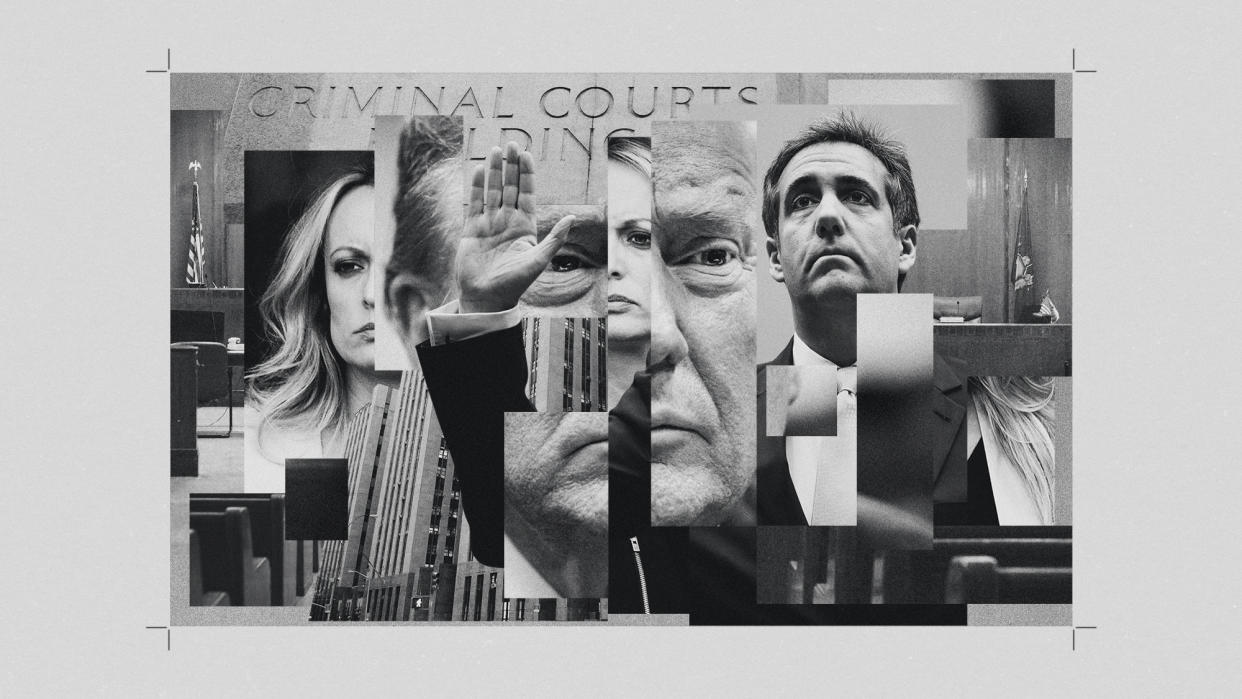Trump hush money trial: what has the jury heard?

- Oops!Something went wrong.Please try again later.
- Oops!Something went wrong.Please try again later.
- Oops!Something went wrong.Please try again later.
The first criminal trial of a former US president has come to a close after four weeks of dramatic testimony in New York.
The prosecution rested its case in the so-called "Trial of the Century" against Donald Trump, charging him with 34 counts of falsifying business records related to a $130,000 (£102,000) hush-money payment made to porn star Stormy Daniels, to hide an alleged affair in 2006. Manhattan lawyers called on a "cast of blockbuster witnesses and produced dozens of surreptitiously recorded conversations and documents to help corroborate their case", said the BBC.
They argue that Trump attempted to influence the 2016 election by having his former personal attorney and fixer Michael Cohen pay to bury a story that Trump believed would cost him votes, and then "authorised an illegal reimbursement scheme" to Cohen to "cover it up". Trump, 77, denies the charges.
What did the commentators say?
Testimony began with David Pecker, the former publisher of the National Enquirer tabloid and Trump ally, called by the prosecution. He described meetings in which he, Cohen and Trump planned to suppress negative stories about Trump during his 2016 campaign for the presidency.
In other words, the secretive journalistic practice of "catch and kill" was real, said The Sunday Times, and Daniels's allegations would have been a "prime example".
Crucially, said Sky News, Pecker told the trial that he knew the payment made to Daniels to buy her life story and "essentially silence her" was probably against the law, given that it was coordinated with Trump's campaign.
Former Manhattan prosecutor Lance Fletcher told the BBC that Pecker came off as "almost an impartial witness".
Next Daniels testified in graphic detail about a sexual encounter with Trump in a Lake Tahoe hotel in 2006 (which Trump denies). She described the encounter as consensual, but uncomfortable, saying she "blacked out" before waking to find herself on a bed with no clothes – despite not consuming drugs or alcohol.
Judge Juan Merchan was forced to reprimand Trump for "cursing audibly" during her evidence. But he also reprimanded prosecutors, after Trump's lawyers argued that the details she shared served only to "inflame" the jury. "There were some things that probably would have been better left unsaid," the judge said.
Trump's former loyal fixer was the prosecution's star witness. Cohen told jurors that Trump instructed him to "fix Stormy Daniels's account of an extramarital liaison" in 2006, and that Trump "personally signed cheques that reimbursed him" for the hush-money payment, said The Guardian. Cohen said he knew the payment violated the Federal Election Campaign Act (although he had claimed otherwise in a letter in 2018). The implication was that Trump must also have believed the money violated election law.
Robert Costello, a lawyer called as the last witness by the defence, testified that Cohen had said "numerous times" that Trump knew nothing about payments to Daniels. Costello said Cohen had claimed he "did this on his own".
The case was "deprived of a big finish" when Trump declined to give testimony, as he had said he would, said Sky News's US correspondent James Matthews.
So while we "lurch towards a verdict that could brand the presumptive Republican nominee a felon", there is a "strange sense of anticlimax", said Michelle Goldberg in The New York Times. Out of all the open cases against Trump, this one is the "only chance that he will face justice for his colossal corruption" before the election, in which he is still leading Biden in most polls.
What next?
Jurors will return on Tuesday for closing arguments, and the judge will instruct them on what, exactly, they might be convicting Trump for. But first, the judge, prosecution and defence will have to finalise what that is.
Falsification of business records is only a misdemeanour. But if Trump falsified the records with the intent to conceal information from voters – essentially committing election fraud – then it becomes a felony, and punishable by up to four years in prison.
Legal experts say the prosecution "did an efficient job", but a conviction is "far from guaranteed", said the BBC. "The pieces are all there. But is it there beyond a reasonable doubt?" said former Brooklyn prosecutor Julie Rendelman. "It only takes one juror."
Even a conviction offers no guarantee of prison time for Trump. And he will "inevitably appeal", said Goldberg, meaning there's "little chance" he'll be incarcerated before the election. Ultimately, whether Trump "truly gets his comeuppance" isn't up to the jury – it is "up to the voters".

